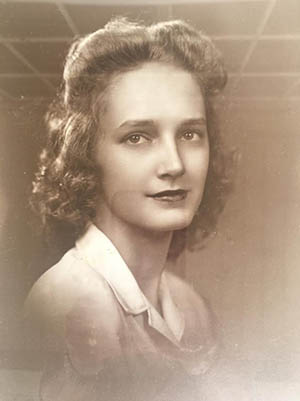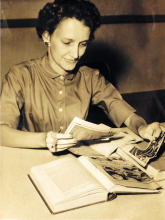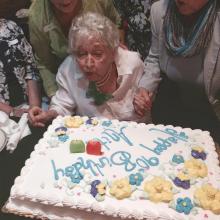Anita Brewer Howard: Austin & ACC Lose a Legend

Austin icon, Anita Walker Brewer Howard, is remembered as a trailblazer. One of the first female reporters at the Austin American-Statesman and Austin Community College’s first public information officer, Howard inspired hope and success. She passed away Sunday, February 24, at the age of 94.
“She was the first employee of Austin Community College, and not just that, she was the most important, admired, and beloved of all the people involved in starting the college,” says Dr. Thomas Hatfield, ACC’s first president. “The community college concept was not understood or appreciated in Austin. We worked together on changing that, and she worked on writing to persuade people.”
When ACC opened in 1973, Hatfield recruited Howard from the Texas Coordinating Higher Education Board to serve as the college’s public information officer. Howard had already thrown her support behind the community college model years prior to becoming the voice for the district.
“At the time ACC was created, she was aware of the dimensions of public support or opposition to creating a tax-supported community college,” says Bill Montgomery, ACC historian. “Before ACC was founded, Anita was intrigued by a community college and thought Austin needed it. She began writing articles for the Statesman on the political side of the benefits of the college.”
 Howard worked as journalist at the Austin American-Statesman for more than a decade during the 1950s and 60s. She started with the society column, before working up to education and politics, a rare feat for women at the time.
Howard worked as journalist at the Austin American-Statesman for more than a decade during the 1950s and 60s. She started with the society column, before working up to education and politics, a rare feat for women at the time.
“Newspaper ink ran in her blood,” says Michael Barnes, Austin American-Statesman journalist. “Her uncle was Stanley Walker, editor of the New York Herald-Tribune in the 1920s. Howard won a Headliners Award for her obituary of Walker.”
Howard brought those skills to ACC, where she helped launch the journalism department in 1984.
 “She was a wonderful writer and had a great rapport with students. Her classes were always filled,” says Judy Sanders, ACC english department chair. “She set a high bar for professors. she was such a legacy. Anita was especially encouraging to women writers. Being a pioneer in the journalism field, she had a lot to share.”
“She was a wonderful writer and had a great rapport with students. Her classes were always filled,” says Judy Sanders, ACC english department chair. “She set a high bar for professors. she was such a legacy. Anita was especially encouraging to women writers. Being a pioneer in the journalism field, she had a lot to share.”
After 37 years in full-time and part-time roles at ACC, Howard officially retired in 2010.
A memorial service will be held 10 a.m., Saturday, March 9, at Austin Peel and Son Funeral Home and Crematory (607 E. Anderson Lane).
Below are memories from her colleagues and friends:
Dr. Thomas Hatfield, First ACC President: Anita would find the human interest part of a story to hook people and keep them reading. I can remember her now, crouched over her keyboard, working so fast. She earned her own connections being such a fine writer and so personable. There was nothing presumptuous about Anita, she was a very natural person. And she was truly native Texan.
Douglas Dawson, ACC English Professor: Anita once told me, during the two months Charles Lindbergh’s baby was unaccounted for in the 1930s, the whole country was frantic. In Lampasas, a six-year old Anita and her sister devised a plan to avoid capture, if the kidnapper made it out that way. I can’t remember all the details, but they were super thorough. To a bright child’s imagination, it didn’t matter the kidnapping happened 1,700 miles away.
Charles Wukasch, ACC English Professor: Anita was a good "people person" and would have made a good counselor had she decided on that for a career. A colleague at my old teaching position had what you might call a personality clash. Anita knew him because he had at one time taken a class with her. Once when Anita and I were discussing those differences, I asked her if she might be a peacemaker and mediate our differences. Her answer was good: She said "I've always made it a policy not to get involved in the feuds of my friends.”
Michael Barnes, Austin American-Statesman Journalist: Her stories often made front-page news, including her exclusive interview with Sarah T. Hughes, the federal judge who administered the oath of office to incoming President Lyndon B. Johnson on Air Force One. After the assassination of President John F. Kennedy on Nov. 22, 1963, this newspaper’s editors sent every available reporter to the Dallas area. The assignment to interview Hughes made Howard nervous. “How was I supposed to find her?” Howard said in 2010. “I just looked her up in the phone book. She said: ‘Come on over.’ I was the only one there.”
Judy Sanders, ACC English Department Chair: She was a very nice, kind person. She was also very engaged in the world around her. When she started working with the journalism department, she had just lost her husband and even though she was devastated she was really excited about this new position and a chance to work with the students. Anita always found a way to stay positive.
Bill Montgomery, ACC Historian: Anita was easy to work with in the sense that she was so competent. She was the public information officer when she started at ACC, and that position was so well suited for her. You could walk up to Anita at any time and have an enjoyable exchange and a learning experience at the same time, she was just a wealth of information.